January/February 2023
Dear Friends of PiAf,
I hope this edition of the Princeton in Africa Fellows Flyer finds you well. This month, we are sharing the stories of current Fellows Elena Daniel (Baylor International Pediatric AIDS Initiative, Eswatini), Nasya Blackwell (Emerging Public Leaders, Ghana), Sarah Louis (Kakenya’s Dream, Kenya) and Esther Alaran (African Leadership Academy, South Africa).
Elena reflects on her proudest accomplishments with BIPAI so far: serving as the lead grant writer for a USAID proposal, implementing a network-wide wellness program that encourages BIPAI staff to incorporate more physical activity into their routine, and more. Read her full entry to see a glimpse into her life in Eswatini- where she makes time to enjoy the country’s natural beauty.
Nasya shares about her communications and social media work at EPL, taking on more work responsibilities, and her experience returning to Ghana for a full year after studying abroad there in 2019. She loves immersing herself in the local culture in Accra, attending traditional events and celebrations, and building a community.
Sarah at Kakenya’s Dream in Kenya shares that she is developing an internal curriculum that is holistic, beneficial to the girls at Kakenya’s Dream and complements Kenya’s national curriculum. She’s happy to have met up with other PiAf Fellows in Nairobi. Read her flyer submission and learn more about her work with Kakenya’s Dream on our impact stories page.
Esther writes about living and working in South Africa, working to implement renewable energy at the African Leadership Academy, finding the right consultant and service provider to meet the challenge of load shedding (power cuts) in Johannesburg and more. Read about Esther’s love of the arts and visiting neighboring countries.
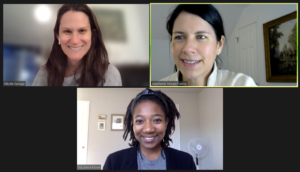
Thank you to members of the Princeton in Africa community who volunteered their time to interview candidates for the 2023-2024 fellowship year. Over 50 members of our alumni body and Board of Directors joined PiAf staff in interviewing over 200 candidates. Good luck to our fellowship candidates!
In a few weeks, PiAf staff, alumni coordinators, board members and the 2022-23 fellowship cohort will meet in Zanzibar for the 2023 Leadership Retreat. Our Fellows will gather to reflect on their fellowships, discuss the next steps and opportunities once their fellowships conclude, and build a stronger community. Princeton in Africa will host events that promote African thought leadership, explore professional opportunities on the continent and encourage networking between our Fellows, alumni, network, host organization partners, and those interested in our program.
Thank you for following along on our Fellows’ journeys. We look forward to sharing details about our 2023 retreat in Zanzibar. Please be sure to subscribe to our Fellows Flyer and our Bimonthly newsletter so you won’t miss updates on our program! Be sure to follow us on our social media platforms. On Instagram, Fellows will be sharing details about their daily lives and we will share highlights of our time in Zanzibar.
LinkedIn | Twitter | Instagram | Facebook | Youtube
Ward Regards,
The PiAf Team
PiAf Connections
Please click below to check out pictures of our Fellows, Alums and other members of the PiAf family meeting up at home and around Africa.
Notes from the Field
By Elena Daniel, '22-'23 Fellow with Baylor International Pediatric AIDS Initiative in Eswatini
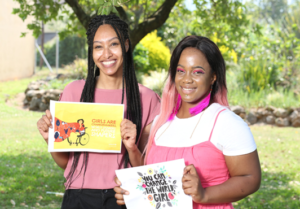
Honoring the Day of the Girl Child at Baylor Eswatini
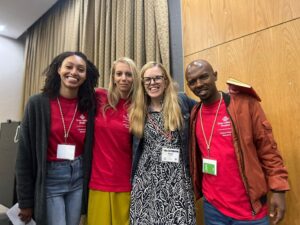
After presenting at the BIPAI Network Meeting in Johannesburg!
Sawubona from Eswatini! My name is Elena Daniel, and I am a Princeton in Africa Fellow serving at the Baylor College of Medicine Children’s Foundation in Mbabane, Eswatini. As a Resource Mobilization and Communications Officer, it is truly inspiring to be a part of a team so committed to providing high-quality, family-oriented care. In addition to HIV/AIDS services, Baylor Foundation Eswatini provides psychosocial support groups like Teen Club and Mother-Baby Club, as well as home visitations, tuberculosis screening/treatment, cervical cancer screenings, and sexual and reproductive health services all free of charge.
One of my proudest moments during my fellowship was serving as the lead grant writer for a USAID proposal to improve HIV prevention and mitigation services for vulnerable children and youth. Grant writing for Baylor Eswatini has not only allowed me to bring my research and writing experience to the forefront but also to collaborate with a cross-functional team to develop comprehensive strategies for bridging healthcare disparities in Eswatini.
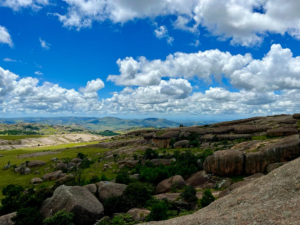
The view from a hike up Sibebe Rock
In addition, I’ve had the opportunity to conduct a retrospective cohort study to examine the factors associated with viral rebound among people living with HIV in Eswatini. Analyzing data from a cohort of over 4000 patients, I recently submitted my findings to the International AIDS Society Conference 2023. This project was a unique opportunity to deepen my understanding of the complexities surrounding viral rebound and hopefully contribute to the development of strategies for maintaining viral suppression in low-resource settings.
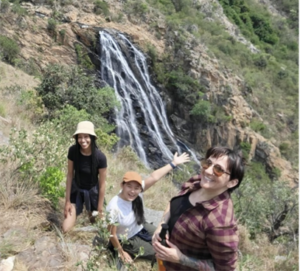
Enjoying the scenery at Malolotja Falls!
At Baylor Foundation Eswatini, I also play a key role in managing communications strategy. This includes developing and executing a comprehensive approach to sharing information about our programs, services, and impact with stakeholders and the wider public. I am also proud to serve as the organizer for our network-wide wellness program, including launching our virtual step challenge. The challenge, which has already garnered over 20 million steps and counting, encourages staff across the BIPAI network to lead healthier lives by incorporating physical activity into their daily routines!
As much as I have been able to accomplish in these past 6 months, I have also been humbled by the resilience and courage of the community I serve. I have seen firsthand the challenges they face, and the strength they draw from each other. I have learned that true impact and meaningful change can only come through collaboration and the forging of strong connections that bridge cultural differences.
My time in Eswatini has been one of self-discovery, where I have been pushed out of my comfort zone, challenged to expand my understanding of the world, and inspired to do more. Each day, I am grateful for the chance to learn and grow, and I am eager to continue making a meaningful impact, wherever my journey takes me.
Notes from the Field
By Nasya Blackwell, '22-'23 Fellow with Emerging Public Leaders in Ghana
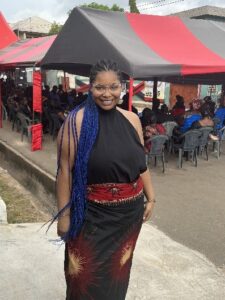
Nasya at traditional Celebration of Life
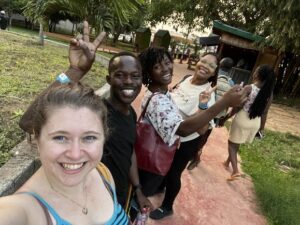
Nasya with EPL team members at Legon Botanical Gardens
Akwaaba and hello from Accra, Ghana. My name is Nasya Blackwell, and I am a Princeton in Africa Fellow at Emerging Public Leaders of Ghana (EPL Ghana). Emerging Public Leaders is a non-profit with three country programs in Liberia, Kenya, and Ghana, all aimed at training and building the next generation of public servants dedicated to social impact. EPL Ghana provides high-achieving Ghanaians with transferable skills and a pathway to lead and support ethical and competent public service delivery. After the two-year fellowship commitment, our fellows become full-time Ghana Civil Service Professionals.
For the first six months of my fellowship, I was the communications intern for EPL Ghana. I managed our social media platforms, pulled stories and information from all country programs to create content, and assisted in creating a new brand identity for EPL Ghana. Now in month seven of my fellowship, I will be pivoting into a new role for grants and fundraising, which is pretty scary, new, and interesting all at once.
In preparing to start my PiAf fellowship, there were a few things I pondered. I studied abroad in Ghana in 2019, so I was feeling indifferent about returning to Ghana. I felt I needed a new experience and was worried I wouldn’t have as transformative of a fellowship because I wasn’t visiting a new country. Surely, Ghana proved me wrong. Returning to Ghana in this fellowship has been vastly different from my study abroad experience. My time as a Princeton in Africa fellow has been filled with lessons, adjustments, and excitement. I have learned so many things about myself in the seven months I have been here.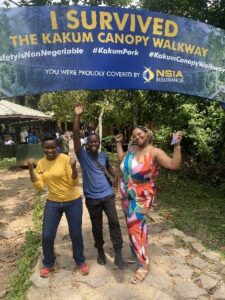
Nasya with EPL Interim ED Caren and coworker Kwasi at Kakum National Park in Cape Coast
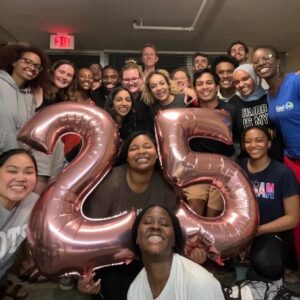
Nasya and the 2022-2023 cohort on her birthday
Culturally, I experienced some new things and learned a lot more. I have been able to attend a traditional wedding and observe a traditional celebration of life that was part of a week-long observation. I’ve learned a lot about the country’s systems and how to navigate them. I even have been faced with some hard realities regarding my identity and how I am seen here as a Black American here. Outside of work, I enjoy exploring Accra with the community I have built here.
I enjoy making videos about my journey to share with my family, friends, and community. Many of whom have never returned to the continent. I believe one of the best things I have done is document my journey through video exploring Ghana. It has given me the opportunity to expose and educate far beyond what we learn about the continent. Though many may not be able to visit Ghana, I like giving people the opportunity to explore far beyond where their feet have physically touched.
The most unexpected and rewarding part of this journey has been the family I gained in my fellow cohort. I am excited to see where this amazing group of individuals continues to grow, go, and impact the world.
Notes from the Field
By Sarah Louis, '22-'23 Fellow with Kakenya's Dream in Kenya
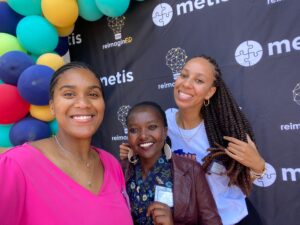
Some colleagues and I at the ReimaginED: Education Innovation Summit in Nairobi
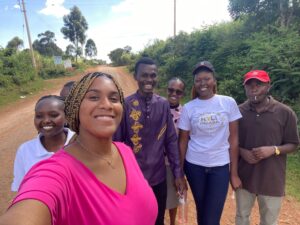
My colleagues and I after marching to celebrate the success of our students on their Kenyan National Exams
Hello everyone! My name is Sarah Louis and I am a PiAf Fellow working as an Education Program Officer at Kakenya’s Dream in southwestern Kenya. Kakenya’s Dream (KD) is an organization dedicated to investing in girls from rural Kenya through educational, health, and leadership initiatives to create agents of change. KD oversees two, all-girls boarding schools— a primary and a secondary school— in rural Kenya. Our students receive scholarships to attend our schools to remove the financial barrier of obtaining an education. In the five months, I have lived and worked in Kenya, I have grown as an individual and developed as a young professional.
I live and work at KD’s secondary school, which is located in the rural village of Isampin. Because my bedroom faces east, every day I wake up and see the beautiful sunrise over the hills of my village. On my walk to work, I am often greeted by our campus’ cows as they eat the grass that surrounds them. At work my most important project is developing an internal curriculum that complements Kenya’s national curriculum (Competency Based Curriculum), is holistic, and is beneficial to our girls. I love this project because I work collaboratively with teachers, administration, and students to develop a comprehensive curriculum. Additionally, I am working on developing an internal assessment test for our grade four students in primary school. Outside of my primary roles as an education program officer, I have had the opportunity to be a guest teacher in the life skills class, do donor work, conduct classroom visits, and even attend an education summit in Nairobi.
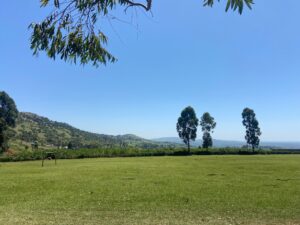
A picture of my village while going for a walk
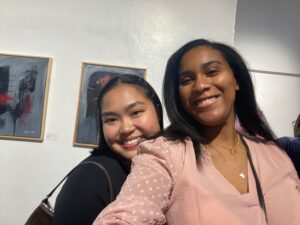
Maddie (2022-23 Fellow with ILRI, Kenya), and I at an art museum in Nairobi
When I am not in the office, I spend a lot of time getting to learn about Maasai culture. The Maasai tribe is one of many tribes in Kenya. In my village, the majority of the inhabitants are Maasai. I have had the opportunity to engage with many aspects of Maasai culture such as attending baby celebrations, learning traditional greetings in the Maa language, partaking in traditional dances, and eating traditional foods. What I love about the culture is that it is community-centric. Although I am a foreigner, I always feel welcome and a part of an extended family in my village.
Additionally, in my free time, I have been able to connect with my other co-fellows in Nairobi. We have gone to new restaurants together, explored Nairobi National Park, and even visited an art museum. I have enjoyed creating new experiences with my co-fellows.
For the remainder of my fellowship, I look forward to growing personally, seeing more of Kenya, and developing as a professional with respect to the advocacy and empowerment of women and girls.
Notes from the Field
By Esther Alaran, '22-'23 Fellow with African Leadership Academy in South Africa

Photo from African Leadership Acamedy’s holiday party in December

Polaroids of Elbi (Elebetel) and I at the Harare, Zimbabwe airport
Unjani everyone! I am Esther Alaran, the Princeton in Africa fellow working at the African Leadership Academy based in Johannesburg, South Africa. My title is a Special Projects fellow which is a fancy way of saying a project manager in the finance office.
I have been living and working in South Africa for the past six months and it has been a journey of growth. I have been working on various initiatives in my short period of being here. Some of the interesting things I have been working on include renewable energy for the school, finding the right consultant and service provider to meet the challenge of load shedding (power cuts) as well as streamlining the foreign payment process. It has been interesting adjusting to load shedding and the impact it has on everyone’s daily life. Everyone must plan around the inevitable load shedding including businesses.
On a personal note, living in a new country alone can be hard at times, but it has also presented the opportunity for me to rediscover myself and the things I like. Outside of work, I like to participate in anything relating to the arts and/or the outdoors. During my first few months here, I saw Cinderella – the ballet at the Johannesburg Theatre, the Drowning Eye at the Market Theatre, and some art showings throughout the region. It’s amazing to see the way people express themselves and how the language of art translates even with cultural differences. I’ve also been able to travel to neighboring countries like Zimbabwe where I saw two other fellows (Neil Wary and Elbetel Assefa). When everything is new and foreign, it is nice to have a familiar face.
As I continue my fellowship, I look forward to my personal and professional growth. This means setting challenging goals and seeking out new opportunities to learn and develop. By embracing challenges and pushing myself, I hope to achieve great things and grow as a person.





